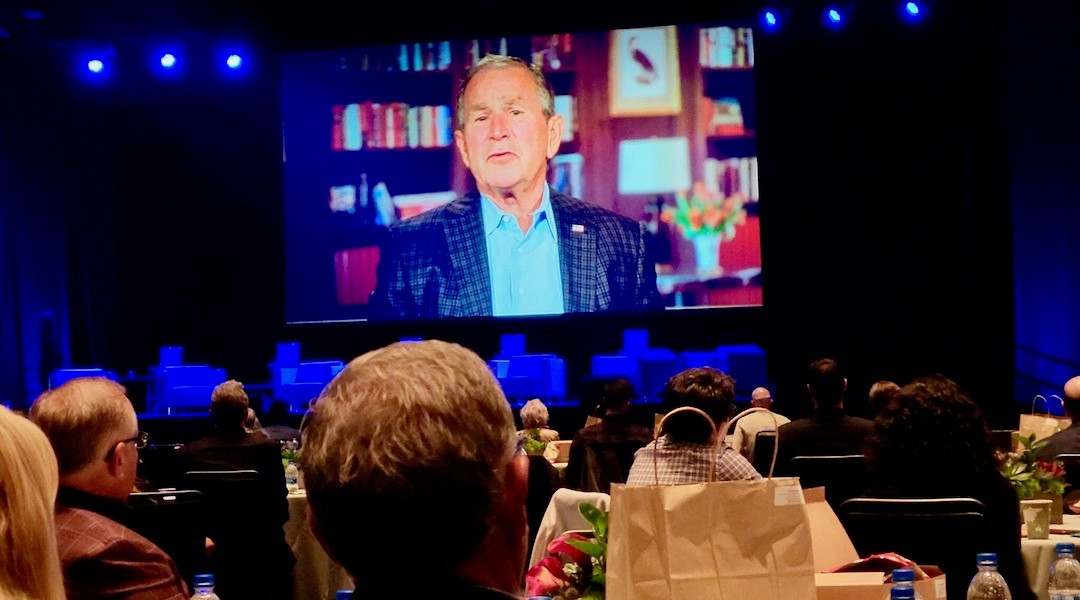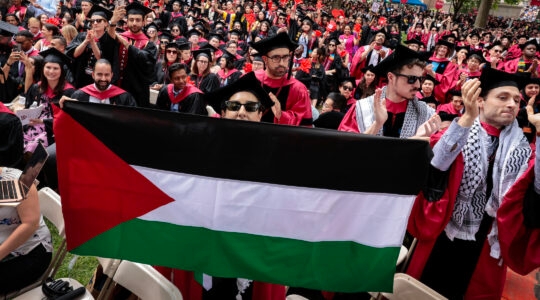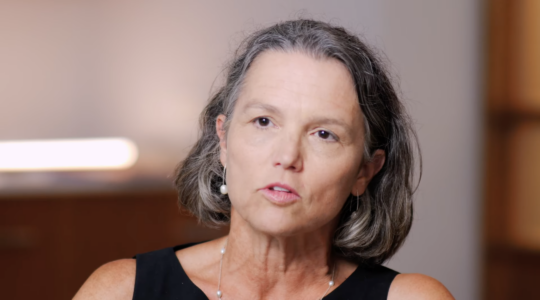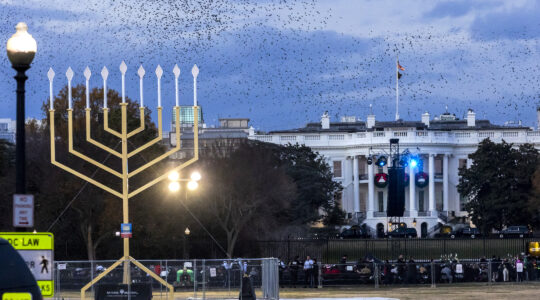(Pittsburgh Jewish Chronicle via JTA) — Standing before a crowd of several hundred, Pittsburgh resident Michele Rosenthal welcomed attendees to the Eradicate Hate Global Summit Monday by remembering her brothers, Cecil and David Rosenthal.
Rosenthal’s voice cracked as she recalled her brothers and the events of three years ago, when a gunman killed them and nine other worshipers at the Tree of Life Synagogue complex here in Pittsburgh.
Cecil and David, she said, were good men who lived good lives. She recalled how they were affectionately known as the “mayors” of Pittsburgh’s Squirrel Hill neighborhood, how they bought flowers for their mother, how they were treated as members of the local fire department and how they often shared a cup of tea with Tree of Life’s custodian.
“They did not judge anyone,” Rosenthal said. “Not by religion, color or ethnicity. They are my example, and they should be your example, too.”
The Eradicate Hate Global Summit 2021, which ran from Oct. 18-20, hosted more than 100 experts on hate and extremism. They were charged not only with sharing their expertise, but with spending the next year working on specific “deliverables” which will be evaluated at next year’s summit, said Laura Ellsworth, first partner in charge of global community service initiatives for the law firm Jones Day.
Ellsworth co-chaired the summit along with Mark Nordenberg, University of Pittsburgh chancellor emeritus. The massacre at the Tree of Life building loomed large over the summit, which was conceived following the attack, said Nordenberg.
“Laura called and said, ‘We need to do something to make certain Pittsburgh becomes better known, not for being the site of this attack, but for its effective and constructive response to hate,’” Nordenberg told the audience.
Ellsworth, who is not Jewish but said she was “close friends with a number of people who were present or lost loved ones on that terrible day,” charged participants with spending the next 12 months developing solutions to combat hate. Evaluations of those proposals will occur at next year’s summit, she said.
Summit panels cast a wide net in their definition of “eradicating hate,” but largely seemed to focus on identifying how hate speech and violent actions have metastasized in the social media era. Some were focused on security: A panel on cryptocurrency discussed how “bad actors” have employed largely untraceable online payments to fund terror operations.
Others focused on legislation: Several speakers discussed the need for better regulation of social media to prevent the spread of hate speech online. (Section 230 of the Federal Communications Decency Act, which effectively immunizes Internet publishers from legal responsibility for the content users publish on their site, was a hot topic; many conservative lawmakers have been seeking in recent months to overturn or reform the law, saying that it provides a shield for partisan attacks.)
Day three of the summit pivoted once again to discuss victim responses. Other panels ran the gamut from discussing domestic terrorism laws to the link between online speech and real-world violence in Myanmar.
Even with such a wide expanse of topics covered at the summit, and so many prominent speakers, including video recordings from former President George W. Bush and Jewish current Homeland Security Secretary Alejandro Mayorkas, organizers took care to continually re-emphasize why they were all gathered in Pittsburgh on that particular date.
Before the start of the various summit sessions, Tree of Life’s Rabbi Hazzan Jeffrey Myers spoke to the audience and offered an invocation. He said that if not for the massacre three years ago, which occurred in the midst of Shabbat services, he would have read that day’s Torah portion, which describes patriarch Abraham welcoming three unknown guests into his home.
The focus on Tree of Life continued throughout the summit, which also included a preview of an upcoming public television documentary about the massacre.
Rita Katz, the executive director and founder of SITE Intelligence Group, explained to summit attendees how the man who attacked three congregations at the Tree of Life building became an emblem of extremism and violence in the years following the massacre. Katz shared a theory she called “the chain of ‘screw your optics,’” in reference to a social media post the alleged shooter wrote just prior to his Oct. 27 attack: “All Jews must die. Screw your optics, I’m going in.”
She described connections between the Pittsburgh attack, which was fueled by anti-immigrant sentiment as well as antisemitism and was widely promoted by hate groups online, and other attacks that followed: the Christchurch Mosque attack in New Zealand; the attack on a Chabad Center in Poway, California; a shooting at a Walmart in El Paso, Texas; the attempted terrorist attack at a Norway mosque; and a thwarted attack on a synagogue in Halle, Germany.
Keynote speaker Jonathan Greenblatt, national director and CEO of the Anti-Defamation League, spoke about the role social media has played in growing antisemitism and other manifestations of hate. “What starts with the Jews,” Greenblatt said, “never ends with the Jews.”
Greenblatt railed against the antisemitism of right-wing extremists as well as that coming from the political left, including the BDS movement on college campuses. “Anti-Zionism is antisemitism, pure and simple,” he said.
Jewish Federation of Greater Pittsburgh President and CEO Jeff Finkelstein, who introduced Greenblatt, was on the planning committee for the summit.
“This is a nice way for our community to share with the world experts on hate,” Finkelstein told the Chronicle. “But this isn’t a program about Pittsburgh, although the program takes place in Pittsburgh. It is one way to remember what took place here.”
The objectives of the conference, Finkelstein said, extend beyond fighting antisemitism.
“Remember it’s ‘anti-hate,’” he said. “Antisemitism is one piece of hatred. This is about hate as a broad topic.”
Speakers at the summit spoke of hatreds beyond antisemitism. Gary Locke, former governor of Washington, discussed experiencing anti-Asian hate while in office; other speakers hailed from the Arab-American Institute, the Muslim Public Affairs Council and the Asian-American Foundation. No speakers representing Latino or LGBT+ groups were listed on the agenda.
In his pre-recorded remarks, Bush thanked those in attendance for taking up the important work of combating hate. “This is a bridge against our nation’s greatest divisions,” he said.
Brad Orsini, who served as director of community security for the Jewish Federation of Greater Pittsburgh from 2017-2020, said he was pleased with the summit.
“This is the first step to get everyone together and see what deliverables come out of this and build really tangible results on the back end,” he said.
Not everyone, though, shared Orsini’s optimism.
The progressive Jewish group Bend the Arc Jewish Action: Pittsburgh and local Latino immigrant advocacy group Casa San Jose Latino Resource and Welcome Center issued a joint statement expressing disappointment that Bush, Mayorkas and former Homeland Security Secretary Tom Ridge were keynote speakers at the summit, saying the Department of Homeland Security, created under Bush’s watch, “exploited anti-Islamic fervor” in its war on terrorism.
“Their inclusion,” the statement said, “undermines the bold and admirable mission of the Eradicate Hate Global Summit, and turns a blind eye to the roots of the hatred that led to the Pittsburgh synagogue shooting.”
A week before the three-day event, eyewitnesses to the Tree of Life shooting, testifying in a pre-trial hearing, said that the alleged perpetrator had made antisemitic comments during his rampage. During the summit, the perpetrator of the 2018 mass shooting at a high school in Parkland, Florida, pleaded guilty to 17 counts of murder.
A version of this article originally appeared in the Pittsburgh Jewish Chronicle, and is reprinted with permission. Additional reporting by JTA staff.
Click here to get the Pittsburgh Jewish Chronicle’s free email newsletter delivered to your inbox.
JTA has documented Jewish history in real-time for over a century. Keep our journalism strong by joining us in supporting independent, award-winning reporting.






